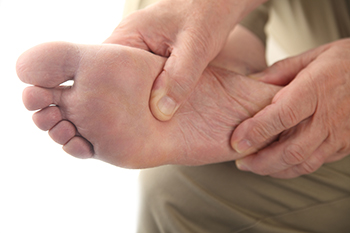Connect With Us
Blog
Items filtered by date: September 2022
Taking Care of Diabetic Feet

A common area for diabetics to experience problems is their feet. We should all be aware of the vital role our feet play in life as they hold us up when we are standing or walking. It is particularly important for diabetics to maintain the health of their feet as diabetes often comes with peripheral neuropathy which can cause numbness and tingling in the feet and pain. Some sensations that those without diabetes feel are not felt by diabetics. Beyond maintaining blood/sugar levels, if you are diabetic, some things you can do for your feet include checking your feet daily to make sure you do not have sores, cuts, bruises, or any reddened or swollen areas, wash feet daily with soap and water, dry them well, apply moisturizer, and keep your toenails trimmed by cutting them straight across. It is suggested that you see a podiatrist regularly to have your feet examined and to obtain additional tips for you to protect your feet from diabetic side effects.
Diabetic foot care is important in preventing foot ailments such as ulcers. If you are suffering from diabetes or have any other concerns about your feet, contact Wendy L. Grossman, DPM from New Jersey. Our doctor can provide the care you need to keep you pain-free and on your feet.
Diabetic Foot Care
Diabetes affects millions of people every year. The condition can damage blood vessels in many parts of the body, especially the feet. Because of this, taking care of your feet is essential if you have diabetes, and having a podiatrist help monitor your foot health is highly recommended.
The Importance of Caring for Your Feet
- Routinely inspect your feet for bruises or sores.
- Wear socks that fit your feet comfortably.
- Wear comfortable shoes that provide adequate support.
Patients with diabetes should have their doctor monitor their blood levels, as blood sugar levels play such a huge role in diabetic care. Monitoring these levels on a regular basis is highly advised.
It is always best to inform your healthcare professional of any concerns you may have regarding your feet, especially for diabetic patients. Early treatment and routine foot examinations are keys to maintaining proper health, especially because severe complications can arise if proper treatment is not applied.
If you have any questions please feel free to contact our office located in Bloomfield, NJ . We offer the newest diagnostic and treatment technologies for all your foot and ankle needs.
Blog Archives
- September 2025
- August 2025
- July 2025
- June 2025
- May 2025
- April 2025
- March 2025
- February 2025
- January 2025
- December 2024
- November 2024
- October 2024
- September 2024
- August 2024
- July 2024
- June 2024
- May 2024
- April 2024
- March 2024
- February 2024
- January 2024
- December 2023
- November 2023
- October 2023
- September 2023
- August 2023
- July 2023
- June 2023
- May 2023
- April 2023
- March 2023
- February 2023
- January 2023
- December 2022
- November 2022
- October 2022
- September 2022
